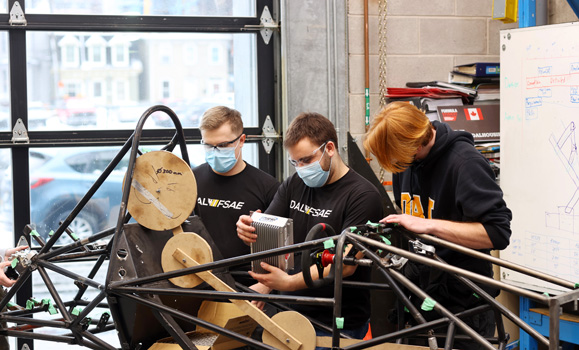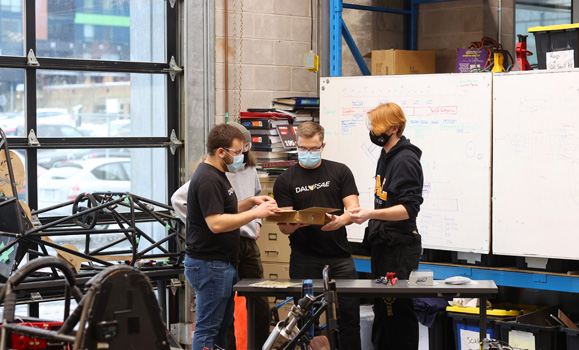As the automotive industry rapidly evolves into a future fuelled by electric-powered vehicles, students in Dalhousie’s Faculty of Engineering are accelerating their own technologies in renewable and sustainable energy.
The Faculty’s (FSAE) student team is building the university’s first electric-powered competition car thanks to a new sponsorship from Emera, which is building on its $10-million investment in the Emera ideaHUB.
“Emera believes in supporting our future leaders by investing in opportunities for young people to learn and grow here at home, ” says Rick Janega, the company’s chief operating officer.
Formula SAE is an interdisciplinary design and engineering challenge for university students across the world. Teams are tasked with building formula-styled race cars for competition. These competitions test a vehicle’s performance in areas such as acceleration, endurance, autocross and the overall engineering design of the vehicle.
“As change leaders of sustainability, we are excited to support the Dal FSAE team as they build an electric vehicle for the first time in this competition. The development of a clean vehicle will have a positive impact on the student community and will inspire learning across the Atlantic region.”
Transitioning from a conventional internal-combustion engine to a battery-powered drivetrain, the FSAE student team is engineering a race car that will compete in the 2023 Formula Student Collegiate Competition. With Emera‚Äôs support, the team now has the resources to upgrade equipment and purchase the essential electric components for their vehicle, including a motor and control electronics. Ã˝
“Going electric is the way of the future and this is something that we needed to do,” says student Mitch Gregory, captain of this year’s FSAE team. “The team is extremely excited to welcome Emera as sponsor, supporting our next generation vehicle.”
Emera invests in clean-energy initiatives that impact the Atlantic region and support its vision of being net-zero by 2050. The organization is also dedicated to building stronger, safer, and more inclusive communities through its Community Investment Program.
Related reading -- A different kind of test drive: Local non‚Äëprofit teams with Dal to help encourage more people to go electric
From gas to electric
Since 2007, Dalhousie’s FSAE team has designed and built 10 gas-powered vehicles and provided more than 300 engineering students with the opportunity to gain hands-on experience in areas such as automotive manufacturing, design, and leadership.
In recent years, many university teams have transitioned their vehicles to electric powered drivetrains. It’s a move that has not only improved the performance of their race-cars but also helped reduced their carbon footprint. It’s also provided students with learning experience in an area poised to take over the world.
Ã˝‚ÄúIf you connect the dots between what we need from a sustainable society and what we are developing here, there are direct links,‚Äù says Mitch. ‚ÄúBuilding battery systems and building electric vehicles, whether it‚Äôs big or small, is a skill set that‚Äôs applicable to a future career in many different industries.‚Äù

The power of partnerships
Over the years, Dalhousie’s Faculty of Engineering has rapidly advanced resources and programs in clean-technology research and education.
“Our curriculum and student experiences continue to evolve to meet the changing issues facing society,” says John Newhook, dean of the Faculty of Engineering. “Students are looking for careers where they can make a positive impact on our community, and opportunities such as FSAE are giving them the chance to explore their creativity and learn innovative thinking outside of the classroom.”
But he adds that great innovation isn‚Äôt possible without key partnerships such as Emera. Ã˝
“The Faculty of Engineering and Emera have many shared priorities including driving innovation, clean energy, and empowering teams and communities. Emera’s climate commitment is admirable and essential to our region’s future, and their dedication and support to our students is key in empowering the next generation of engineers.”
In 2021, Emera unveiled its Climate Commitment with a vision of achieving net zero CO2 emissions by 2050. The organization’s net-zero vision will require investments in emerging technologies and working closely with regulators, policymakers, and partners.
‚ÄúAt Emera, we know we need innovative and diverse ways of thinking to reach our net-zero vision, and we believe the Faculty of Engineering will develop bold and strategic leaders who are working to achieve this vision for our province,‚Äù says Janega. ‚ÄúBuilding on our strong relationship with the Emera ideaHUB, the opportunity to support the ∫⁄¡œ≥‘πœÕ¯FSAE team is a perfect fit.‚Äù

The road ahead
Mitch says thanks to this new support his team has the capacity to bring its innovative design concepts to life. This fall, the team begins building a new frame for the electric vehicle and installing the electrical components of the car. They hope to have the vehicle ready for testing by early 2023.
Ã˝
“Emera’s sponsorship will immediately enable development to progress from virtual CAD drawings to real world prototypes,” says Mitch. “Without their support we would not be able to move on to build our dream.”
Related reading -- Advanced battery scientists join exclusive Tesla partnership at Dal in research chair roles

